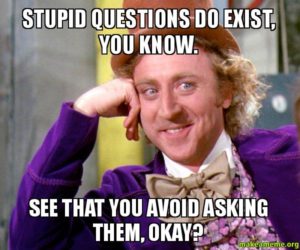Last Updated on 2022-07-20 by Joop Beris
For those of you who like to read my blog, you’ll know I like to take answer these “Questions for atheists” lists that believers publish. They seem to think that these questions are clever, insightful and sure to stump any atheist. More often than not they are actually the opposite. Inane questions that are filled to the brim with presuppositions, lack of current scientific understanding and extremely leading are the norm. Nothing that would stump most atheists because we’ve thought about all these things and more often that not, that’s why we’re atheists.
The following list apparently appears in Dr. Norman Geisler’s book “Conversational Evangelism” and if it’s any indication of the quality of rest of the book, my advice would be to steer clear of this title. So without further ado, here is the list of “clever” questions for atheists!
Questions for Atheists, Agnostics and Non-Christians
The list begins with a number of questions for atheists. Since I am one, that’s very convenient.
Questions for atheists
1. Are you absolutely sure there is no God? If not, then is it not possible that there is a God? And if it is possible that God exists, then can you think of any reason that would keep you from wanting to look at the evidence?
Absolutely 100% sure? No. As sure as one can practically be sure about anything? Yes.
Since there is no reliable evidence of any kind for the existence of a god, there is no reason to believe that there is something like a god. It may be that there is a god but without evidence to indicate there is, it’s useless to assume there must be one. It’s the same as for leprechauns, Bigfoot or the Easter Bunny.
Is there a reason that would keep me from wanting to look at the evidence? No, no reason at all. I’m fully open to consider all reliable evidence for a god to exist. I suggest someone provide me with some because so far, I’ve found nothing.
2. Would you agree that intelligently designed things call for an intelligent designer of them? If so, then would you agree that evidence for intelligent design in the universe would be evidence for a designer of the universe?
Yes, things that are designed have someone who designed them. So yes, if we found evidence of intelligent design in the universe, that would indicate a designer.
However, here again we have no evidence to indicate a designer. The universe being complex does not mean it was designed. Quite the contrary, actually. Designers usually design things to make them as simple as possible. Even if we had evidence that the universe was designed, it still wouldn’t prove that a god did it, much less your particular god.
3. Would you agree that nothing cannot produce something? If so, then if the universe did not exist but then came to exist, wouldn’t this be evidence of a cause beyond the universe?
There is no indication that the universe was created from nothing (creatio ex nihilo), the Big Bang being just a stage in the development of the universe. This absolute nothing is a philosophical nothing or a theological idea but in nature, we have not found absolute nothing. There are always quantum fluctuations. See Lawrence Krauss’ book “A universe from nothing” which I have reviewed earlier.
4. Would you agree with me that just because we cannot see something with our eyes—such as our mind, gravity, magnetism, the wind—that does not mean it doesn’t exist?
Yes, that is an absurd notion. It would mean that for blind people, nothing would exist. That being said, there are other ways besides our eyes to learn about the world around us. Conversely, if something can not be seen, heard, felt, tasted, smelled or measured in any way or form, how can we be sure it exists except as a figment of our imagination?
5. Would you also agree that just because we cannot see God with our eyes does not necessarily mean He doesn’t exist?
Yes, I would agree with that. See my remark to the previous question though. If we can not detect something by any means, how can we be sure it exists?
6. In the light of the big bang evidence for the origin of the universe, is it more reasonable to believe that no one created something out of nothing or someone created something out of nothing?
Again, the Big Bang was not creation out of nothing. Even if it were, it would still be more reasonable to assume that the universe simply popped into existence than to propose a deity that created the universe. The introduction of a deity does not solve the question of creation (how did the creator produce something out of nothing?) plus it complicates matters because now we have to account for the creator too. How did the creator get there? The introduction of a deity has no explanatory power.
7. Would you agree that something presently exists? If something presently exists, and something cannot come from nothing, then would you also agree that something must have always existed?
Again, there is this “nothing”. There is no evidence that there ever was an absolute nothing. It is possible, and maybe even likely, that something has always existed.
8. If it takes an intelligent being to produce an encyclopedia, then would it not also take an intelligent being to produce the equivalent of 1000 sets of an encyclopedia full of information in the first one-celled animal? (Even atheists such as Richard Dawkins acknowledges that “amoebas have as much information in their DNA as 1000 Encyclopaedia Britannicas.” Richard Dawkins, The Blind Watchmaker (New York: WW. Norton and Co., 1996), 116.)
It would, if single-celled organisms contained actual encyclopedias inside their DNA. The fact of the matter is that they don’t. Lots of information does not equal encyclopedias. DNA is not a book or a computer program. It is simply a complex molecule which can arise naturally and which has simpler forebears, such as RNA, which also can arise naturally.
9. If an effect cannot be greater than its cause (since you can’t give what you do not have to give), then does it not make more sense that mind produced matter than that matter produced mind, as atheists say?
An effect can not be greater than it’s cause? Come again? Ever seen an avalanche? Or an explosion? The cause can be minute but the effect doesn’t have to be. How could mind create matter? Can a mind exist separately from matter? Explain to me how this works, please. What do you mean by “mind” exactly? Define your terms before you ask questions which you don’t seem to understand.
10. Is there anything wrong anywhere? If so, how can we know unless there is a moral law?
Why would we need a moral law to know if something is wrong? I know, you’re going to introduce a “lawgiver” next, aren’t you? Why would you assume that we can not know what is right from wrong without someone telling us? Are you suggesting that your god gave us morality? If so, how come our morality today is different and much improved since the days of the bible?
11. If every law needs a lawgiver, does it not make sense to say a moral law needs a Moral Lawgiver?
What’s with the odd caps here? Yes, a law requires a lawgiver but only if we are talking about laws in the legal sense, not in a scientific sense. However, there is no such thing as a moral law. At least not one that is universal or universally accepted. Our sense of morality does not require a moral lawgiver, certainly not one that we need to capitalise.
12. Would you agree that if it took intelligence to make a model universe in a science lab, then it took super-intelligence to make the real universe?
No. Again, just because the universe is complex, doesn’t mean it was designed. Complexity does not require a designer.
13. Would you agree that it takes a cause to make a small glass ball found in the woods? And would you agree that making the ball larger does not eliminate the need for a cause? If so, then doesn’t the biggest ball of all (the whole universe) need a cause?
No. What kind of silly analogy is this? How is the universe similar to a glass ball? How do you know the universe is a ball at all?
14. If there is a cause beyond the whole finite (limited) universe, would not this cause have to be beyond the finite, namely, non-finite or infinite?
The universe is finite now? I must have missed the bulletin.
15. In the light of the anthropic principle (that the universe was fine-tuned for the emergence of life from its very inception), wouldn’t it make sense to say there was an intelligent being who preplanned human life?
That’s not what the anthropic principle says. It says that observations of the universe must be compatible with the intelligent life observing that universe. Note that nowhere does it say that this life must be human, or Earth-bound or even carbon-based. As such, your assertion does not make sense.
This concludes the terrible and terribly leading questions for atheists. Next, please see my answers to the questions for agnostics.
Questions for Agnostics
1. Of the two possible kinds of agnostic, which kind are you: 1) Strong agnostic who says we can’t know anything for sure? or 2) Weak agnostic who says we don’t know anything for sure (but we could if we had enough evidence)?
That’s not what agnosticism means. It refers specifically to our ability to understand or know the supernatural, such as deities.
2. If you are the strong kind, then how do you know for sure that you can’t know anything for sure?
See above…
3. If you are the weak kind of agnostic, then is it not possible that we could know for sure that God exists (if we had enough evidence)?
Yes, if we had enough evidence, we could know either way, i.e. that a god does or does not exist.
4. Do you agree that an open-minded person should be willing to look at all the evidence? If so, then are you willing to look at the evidence for God’s existence?
Yes, absolutely. Now if only we had some evidence…
As you can see, another set of questions for atheists which are terribly leading, misleading or simply not very clever. The author clearly lacks basic scientific understanding and is not concerned with arriving at the truth through unbiased questions. Now my questions for atheists would be: how did I do and how would you answer them?




